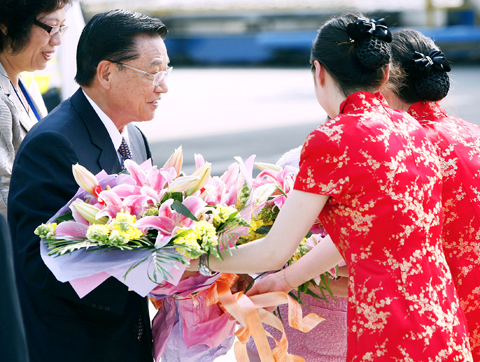Straits Exchange Foundation (SEF) Chairman Chiang Pin-kung (江丙坤) arrived in Beijing yesterday for historic talks on improved cross-strait relations.
“We hope through the talks this time that the two sides will be able to achieve a win-win situation so that people across the Taiwan Strait can live better,” Chiang said before departing Taipei.
He said his four-day trip to Beijing was a “journey to build mutual trust” with China.

PHOTO: AP
The two sides had their first historic talks in 1993 in Singapore, but China suspended further dialogue in 1999 to retaliate against Taiwanese officials advocating independence.
“Although the schedule sounds simple, the task is very heavy and the significance is also quite heavy,” Chiang said.
“These meeting topics are a starting point, which affects the development of relations between the two sides,” he said.
“Basically, what we are trying to achieve through the talks is cross-strait peace and prosperity as well as stability in the Asia-Pacific region,” Chiang said.
The delegation was welcomed upon its arrival by Zheng Lizhong (鄭立中), the executive deputy director of the Taiwan Affairs Office in China’s State Council.
Liang was scheduled to escort the 19-member delegation to a formal reception last night.
Weekend charter flights and opening Taiwan to more Chinese tourists will be discussed by Chiang and his Chinese counterpart Chen Yunlin (陳雲林), head of the Association for Relations Across the Taiwan Strait (ARATS) today.
Chiang was expected to sign agreements with Chen and then meet Chinese President Hu Jintao (胡錦濤) tomorrow. The delegation will return home on Saturday.
The group flew from Taipei to Macau and then took an Air Macau flight to Beijing. Chiang did not make any public comments upon arrival.
The official China Daily said yesterday that this week’s meeting reflected the “warming of relations” since President Ma Ying-jeou (馬英九) replaced former president Chen Shui-bian (陳水扁).
Meanwhile, Premier Liu Chao-shiuan (劉兆玄) said yesterday that the cross-strait cargo charter flight issue would surely be included in today’s negotiation, rebutting criticism that the government had allowed Beijing to set the agenda for the talks.
Liu said the deals on direct weekend charter flights for passengers and Chinese tourists would materialize soon because both sides of the Strait had exchanged views on the issues many times.
“But there surely will be discussion of the cargo flight issue during the negotiation,” he said, adding that he would comment further after the negotiations.
Liu said the Cabinet was scheduled to approve a proposal next Thursday to open the small three links — the direct transportation between Kinmen and Matsu and the Chinese port cities of Xiamen and Fuzhou — to all Taiwanese.
Meanwhile, the Ministry of National Defense announced yesterday that it had indefinitely postponed a live-fire exercise scheduled for tomorrow on Kinmen, after holding one on Monday.
“Cross-strait relations is one of the factors weighed when we made the decision,” ministry spokeswoman Chi Yu-lan (池玉蘭) told Agence France-Presse.
“We are pleased to see bilateral ties moving on the track of peace and stability,” she said.
ADDITIONAL REPORTING BY SHIH HSIU-CHUAN

The US government has signed defense cooperation agreements with Japan and the Philippines to boost the deterrence capabilities of countries in the first island chain, a report by the National Security Bureau (NSB) showed. The main countries on the first island chain include the two nations and Taiwan. The bureau is to present the report at a meeting of the legislature’s Foreign Affairs and National Defense Committee tomorrow. The US military has deployed Typhon missile systems to Japan’s Yamaguchi Prefecture and Zambales province in the Philippines during their joint military exercises. It has also installed NMESIS anti-ship systems in Japan’s Okinawa

‘WIN-WIN’: The Philippines, and central and eastern European countries are important potential drone cooperation partners, Minister of Foreign Affairs Lin Chia-lung said Minister of Foreign Affairs Lin Chia-lung (林佳龍) in an interview published yesterday confirmed that there are joint ventures between Taiwan and Poland in the drone industry. Lin made the remark in an exclusive interview with the Chinese-language Liberty Times (the Taipei Times’ sister paper). The government-backed Taiwan Excellence Drone International Business Opportunities Alliance and the Polish Chamber of Unmanned Systems on Wednesday last week signed a memorandum of understanding in Poland to develop a “non-China” supply chain for drones and work together on key technologies. Asked if Taiwan prioritized Poland among central and eastern European countries in drone collaboration, Lin

The Chien Feng IV (勁蜂, Mighty Hornet) loitering munition is on track to enter flight tests next month in connection with potential adoption by Taiwanese and US armed forces, a government source said yesterday. The kamikaze drone, which boasts a range of 1,000km, debuted at the Taipei Aerospace and Defense Technology Exhibition in September, the official said on condition of anonymity. The Chungshan Institute of Science and Technology and US-based Kratos Defense jointly developed the platform by leveraging the engine and airframe of the latter’s MQM-178 Firejet target drone, they said. The uncrewed aerial vehicle is designed to utilize an artificial intelligence computer

Renewed border fighting between Thailand and Cambodia showed no signs of abating yesterday, leaving hundreds of thousands of displaced people in both countries living in strained conditions as more flooded into temporary shelters. Reporters on the Thai side of the border heard sounds of outgoing, indirect fire yesterday. About 400,000 people have been evacuated from affected areas in Thailand and about 700 schools closed while fighting was ongoing in four border provinces, said Thai Rear Admiral Surasant Kongsiri, a spokesman for the military. Cambodia evacuated more than 127,000 villagers and closed hundreds of schools, the Thai Ministry of Defense said. Thailand’s military announced that